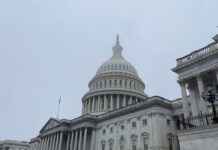
(GA Recorder) – Another $36 million would go toward mental health services in next year’s $27.2 billion budget as state lawmakers work on erasing spending cuts made last year.
House lawmakers added funding to the $22 million Gov. Brian Kemp penciled into the budget, bringing the increased funding for the Department of Behavioral Health and Developmental Disabilities up to $58 million.
That includes another $9.2 million for core services, enabling the state and its providers to serve another 7,400 people. And nearly $400,000 was added to support the 988 National Suicide Prevention Lifeline and the state’s own suicide prevention efforts, which will include hiring the state’s first suicide epidemiologist.
House Speaker David Ralston, a Blue Ridge Republican, called the funding increases for mental health services “a beginning.”
“We know that COVID-19 has put a strain on our suicide prevention programs, and it is our intent to bolster these necessary services,” Ralston told reporters Friday.
Ralston said he hopes placing an emphasis on mental health on the state level will help encourage people to seek out the help they need.
“Part of our work is to remove the stigma from seeking help for behavior, health, or developmental disability services,” he said. “It is nothing to be ashamed of, and it is nothing to hide from.”
Critics, though, have criticized the GOP spending plan for not fully restoring the 10% cuts made throughout the budget last year when budget writers expected the worst as the pandemic brought the economy to a crawl. Instead of falling off sharply, state revenues have so far increased this year.
House lawmakers, for example, backed the governor’s plan to restore 60% of the cuts made to state’s education funding formula.
The governor, who sets the level of spending each year, did slightly increase the revenue estimate by about $7.6 million to account for the proceeds from a new rideshare tax that passed last year. The state has about $2.7 billion in reserves.
“This is the equivalent of not having enough food in the refrigerator but instead of going into our savings account has more than enough money to fill the fridge, we take what little extra money we do have and put it into the savings account and then turn to the federal government with our hand out,” said Rep. Jasmine Clark, a Lilburn Democrat.
The budget, which takes effect July 1, passed Friday morning with a 136-to-31 vote and without the same urgency lawmakers showed while buttoning up a spending plan through the June in case the COVID-19 pandemic upended the session like it did last March. The budget – the only business lawmakers are constitutionally required to do each year – now moves to the Senate.
“As we were preparing for the economy to fall out from under us, as it certainly looked and appeared like it would back in June, to today, when we see things have somewhat stabilized but realize that there are still storm waves on the horizon in front of us,” said Rep. Terry England, an Auburn Republican who chairs the House committee responsible for the budget.
“And so in doing so, we have done what we’ve always done in this state, no matter the party: crafted a very conservative budget that looks after those who sent us here,” he said.
Hail Mary on Medicaid expansion fails
Democrats have criticized GOP lawmakers for accepting federal disaster relief money – and complaining that the formula in the proposed package being hashed out now shortchanges the state – while refusing for years to accept billions of dollars to expand Medicaid under the Affordable Care Act.

The spending plan, which starts July 1, includes about $76 million to begin implementing the governor’s health care plan. A portion of his plan, which would slightly expand Medicaid, is facing new scrutiny from the Biden administration because of a requirement that participants satisfy a work or activity requirement of 80 hours a month.
House Minority Leader James Beverly proposed Friday that lawmakers shift that money toward fully expanding Medicaid, saying the state’s waiver application will probably end up “null and void.” That push failed with a 68-to-98 vote.
“We should start thinking about how do we use that money to actually expand Medicaid?” the Macon Democrat said.
Democrats in Washington want to include new financial incentives in the next round of disaster relief in hopes of winning over holdout states like Georgia, which is one of a dozen states that did not expand Medicaid.
But for now, state Republicans are holding out hope that the Biden administration will ultimately support Georgia’s health care plan.
“I’m hopeful that they will look favorably on what we’re trying to do, which is simply trying to tailor a Georgia solution to Georgia needs,” Ralston told reporters Friday.






